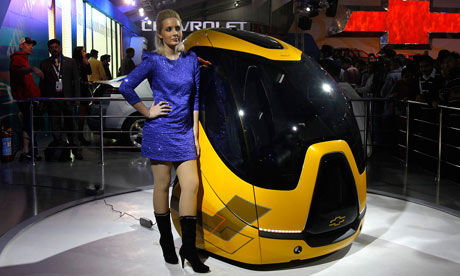
Detroit's gargantuan motor show starts on 9 January. When the doors open at 6am on Monday, more than 5,000 journalists from 50-plus countries will descend on the city's Cobo convention centre for a first look at the hottest new vehicles.
Once again the world's top car firms are showcasing electric cars and hybrid vehicles. BMW, General Motors, Lexus, Mercedes, Nissan, Toyota, Volvo – all have new electric or hybrid cars to show off. As usual they will garner huge amounts of coverage. But will anyone buy them?
The signs are not good. Last year GM's Chevy Volt was named car of the year at the Detroit auto show, beating the Nissan Leaf. The Volt runs on a combination of battery and old school combustion engine, the Leaf is all electric – they were heralded as the first mass market electric cars. Neither has proved a hit with consumers. Both missed their 10,000 vehicle sales targets for the year, Nissan by a fraction and Volt by more than 2,000. By comparison, Toyota sold 308,510 Camrys last year. As if to rub it in, the new year got off to a bad start for the Volt, with GM asking owners to bring in their cars to dealerships after problems with their batteries.
Some analysts are predicting this could be a pivotal year for the industry's flirtation with alternative fuels. After the worst recession in living memory, car sales are bouncing back. Overall, auto sales were up more than 10% in the US last year. But while consumers returned to the showrooms, sales of "alternative power source light vehicles" rose just 2.3%, according to the analysts WardsAuto.
Even industry executives are not optimistic. A survey of global car executives by KPMG recently found that they do not expect electric-car sales to exceed 15% of annual global car sales before 2025. This figure is still far higher than most independent analysts offer.
"This could be a crunch year," said Ed Hellwig of the auto analysts Edmunds.com. Consumers will have access to more supply and more choices in alternative-fuel cars than ever in 2012. "This could be the year when we see whether this is really ready to go mainstream or the public just aren't interested," he said.
Sales of hybrid cars in general have been flat for the past few years, said Anthony Pratt, director of forecasting at the car industry analysts Polk. Even in Europe, where petrol prices are far higher, the electric and hybrid market remained tiny, he said. And in the short term things could even get worse.
Alternative-fuel cars are competing with vehicles from manufacturers that have undergone a Damascene conversion to energy efficiency. Detroit's big three in particular suffered terribly after betting their businesses on gas-guzzling behemoths as the recession bit and petrol prices soared. Now all the major companies boast fuel-efficient technology and less thirsty cars that make the switch to hybrid or electric vehicles more difficult for consumers to make on a purely economic level.
Paul Taylor, the National Automobile Dealers Association's chief economist, said that, much to the chagrin of car manufacturers and the green lobby, consumers were conducting a "rational cost-benefit analysis". He added: "People are enthusiastic about hybrid and electric cars but when they see how much they cost, they want to test drive something else."
This lack of enthusiasm has been going on for some time. Even when oil prices reached record highs, sales of alternatively fuelled cars rose only modestly, Taylor said.
Brandon Mason, senior analyst at PricewaterhouseCoopers' Autofacts group, said more efficient combustion engines are cutting consumption by 15%-25% in some vehicles. "There are a lot of very competitive and fuel-efficient cars out there right now."
However, new fuels are going to play an increasingly important role, Mason said. "With any new technology you need to bring the price down and get the infrastructure right. That is going to take some time."
In the long term, alternative fuels will receive some significant boosts. The US government has asked manufacturers to make 35.5 miles per US gallon (mpg) – equivalent to 15km a litre – standard by 2016, far above today's 22mpg average but still within reach of old technology. By 2025, the US wants manufacturers to have doubled fuel efficiency.
On top of that, some states, including California, require manufacturers to have at least one zero-emission car in their fleets. Over time these factors should help boost alternative-fuel sales.
Meanwhile, few expect the carmakers to cut back their heavy investment in new technologies. "It's the price of poker," Pratt said. Manufacturers have to be involved in the latest technology. But that technology is in its infancy, and the next five years could be even more challenging."

